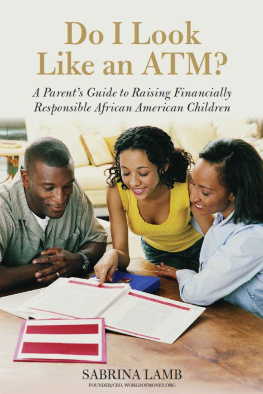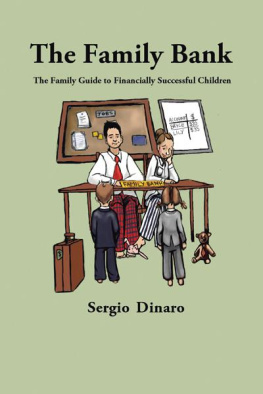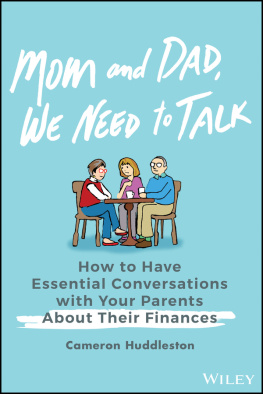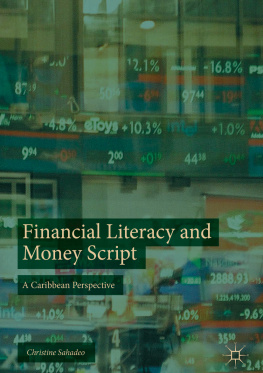

Copyright 2013 by Sabrina Lamb
All rights reserved
First edition
Published by Lawrence Hill Books, an imprint of
Chicago Review Press, Incorporated
814 North Franklin Street
Chicago, Illinois 60610
ISBN 978-1-61374-405-5
Cover design: John Yates at Stealworks.com
Cover photograph:
Ocean / Corbis
Interior design: PerfecType, Nashville, TN
Excerpt (Our deepest fear liberates others.) from A Return to Love by Marianne Williamson, Copyright
1992 by Marianne Williamson. Reprinted by permission of HarperCollins Publishers.
Library of Congress Cataloging-in-Publication Data
Lamb, Sabrina.
Do I look like an ATM? : a parents guide to raising financially responsible African American children / Sabrina Lamb. 1st ed.
p. cm.
Includes index.
ISBN 978-1-61374-405-5 (pbk.)
1. African American childrenFinance, Personal. 2. ChildrenUnited StatesFinance, Personal. 3. Child rearingUnited States. I. Title.
HQ784.S4L36 2013
332.02400830973dc23
2012040564
Printed in the United States of America
5 4 3 2 1
When you teach your son, you teach your sons son.
T ALMUD
CONTENTS
INTRODUCTION
Wake-Up Call
You will always be your childs favorite toy. V ICKI L ANSKY
CHILDREN AND MONEY are both like iron rings we put through our noses. They lead us around wherever they want. We forget that we are the ones who designed them. Simply put, your angelic darling of a child has you bamboozled. Despite your protests to the contrary, your little bundle of joy has you wrapped around her little manipulative finger because she knows you so well.
You see, from the day you placed her in her bassinette, your child has seen you coo and fawn over her so often that she can anticipate your next move, especially when it comes to money. Your unsympathetic child watches as your heart palpitates, your palms become sweaty, and your voice climbs an octave. Your perfect child is deaf to the Do I look like an ATM? tirades that come in response to their urgent, countless pleas to install a swimming pool in the backyard or to have a sweet sixteen party at the Waldorf Astoria.
Dear parent, you may hate to admit it, but your child was born a professional beggar. Sound a tad harsh? What about crumb snatcher? Master manipulator? How about financial terrorist? No need to become protective of the cute little pickpocket you are living with; sooner or later, you are going to be living in the poorhouse as your firstborn robs your 401(k) retirement account to fund his wish list for countless Christmas Futures.
Remember when your child uttered his first words? Remember how you phoned your relatives, thinking your child was expressing affection for you? It was a con game. Your baby knew that, in order to get your attention to appease his fleeting desires, he would have to address you as Mama or Dada. Sadly, your child is naturally more inclined to utter Gimme or I wanna as his very first words. From his perspective, these words get right to the point without wasting time with unnecessary salutations.
Still, you may protest, But I teach my child how to be appreciative. Really, I do! King or Queen of Denial, far be it for me to disagree. But lets take a moment to review a scenario Id venture to guess youve experienced a few times before:
Can I have a dollar? your child asks.
Say please, you sternly reply.
Pleeeeease, your child parrots.
Confident that in that moment you have socialized your child to become the next Mahatma Gandhi, you satisfy your childs demand. And your child believes, in spite of your denial, that you are indeed an automatic teller machine.
And so it continues.
Open your mouth and ask for what you want, you encourage your toddler when she points to all things shiny, dangling, or easily shattered into little pieces.
And so it continues.
Spouse of mine, you say, little Anthony said please. Isnt that soooooo precious? Now would you get that quarter away from him before he chokes himself to death?
And so it continues.
What did you do with the allowance I gave you yesterday? Hand me my purse. You know you need to learn how to budget!
And so it continues.
Honey, would you take that child to the mall and buy him another pair of Nike Air Force 1 High sneakers so he can stop all that incessant pouting?
And so it continues.
Wouldnt you love to have a dollar for every time your child has said, I want some money, or Would you buy me a new toy rocket ship? By now, you would have a fortune sufficient to retire and cruise around the world on your private yacht. But your wonderful teenager has other plans. These scenarios occur in countless households all over America and all over the world. Parents like you have been duped into spending their lives being manipulated by sweet little beggars. What else would one call a human being who spends the majority of her life uttering (even in her sleep), Can I have____?
It did not start off that way. When you decided to have a child, you thought that you were in control. More than anything in the world, you desired to bestow limitless love on your child, perhaps even more than you had personally experienced. You were determined to be your definition of a perfect parent. And you were sure your child would bond with you and love you in return. Your worth as a parent and as a human being would be reflected in the love of your child, who would boast, I have the best mommy and daddy in the whole world.
That was the starting plan, but that is not the way it turned out. When it comes to financial matters, your child has learned that he can manipulate you because you are so concerned with how he feels about you. And as long as his loving you is more important to you than your nurturing a compassionate, financially responsible, self-reliant, service-minded child who will serve the world, you can forget about sailing around the world on your private yacht. Avoiding (or refusing) opportunities to teach children about money and to take loving care of yourself will result in your children becoming manipulative and selfish adults who lack the tools to survive and prosper in the world.
But not to worrythere is hope, and you are not alone. Do I Look Like an ATM? A Parents Guide to Raising Financially Responsible African American Children is here to the rescue.
As the founding chief executive officer of the financial education organization WorldofMoney.org, I am uniquely qualified to write this book because of my blunt conversations with and candid observations of children like yours. And while I adore children and believe that it is my life mission to empower them through financial education, my compassion for them does not extend to allowing them to marinate in the illusion of entitlement and ignorance.
And, after reading this book, nor will you, dear parent.
Children came into the world without a reflection button that would enable them to say, Oh, mother and father of mine, there is no need to waste your hard-earned dollars on a new PlayStation. That would be frivolous. May we please sit down as a family and review our household expenses? May we review where we can eliminate unnecessary expenditures? May we designate each Friday to be Coupon Clipping Night? Unless you gave birth to frugal billionaire Warren Buffet, youll never hear your son say, Mother dear, why not purchase my school clothes when they are on sale? Our family could financially benefit from the savings, and then we could donate the clothes that I have outgrown to charity.
Next page








